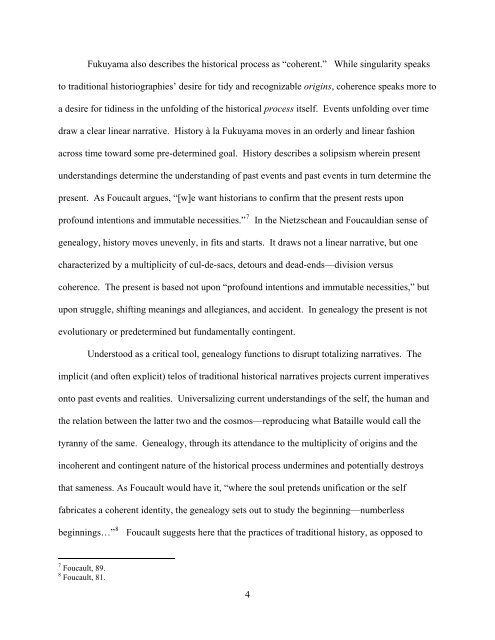A Genealogy of the Extraterrestrial in American Culture
A Genealogy of the Extraterrestrial in American Culture
A Genealogy of the Extraterrestrial in American Culture
You also want an ePaper? Increase the reach of your titles
YUMPU automatically turns print PDFs into web optimized ePapers that Google loves.
Fukuyama also describes <strong>the</strong> historical process as “coherent.” While s<strong>in</strong>gularity speaks<br />
to traditional historiographies’ desire for tidy and recognizable orig<strong>in</strong>s, coherence speaks more to<br />
a desire for tid<strong>in</strong>ess <strong>in</strong> <strong>the</strong> unfold<strong>in</strong>g <strong>of</strong> <strong>the</strong> historical process itself. Events unfold<strong>in</strong>g over time<br />
draw a clear l<strong>in</strong>ear narrative. History à la Fukuyama moves <strong>in</strong> an orderly and l<strong>in</strong>ear fashion<br />
across time toward some pre-determ<strong>in</strong>ed goal. History describes a solipsism where<strong>in</strong> present<br />
understand<strong>in</strong>gs determ<strong>in</strong>e <strong>the</strong> understand<strong>in</strong>g <strong>of</strong> past events and past events <strong>in</strong> turn determ<strong>in</strong>e <strong>the</strong><br />
present. As Foucault argues, “[w]e want historians to confirm that <strong>the</strong> present rests upon<br />
pr<strong>of</strong>ound <strong>in</strong>tentions and immutable necessities.” 7<br />
In <strong>the</strong> Nietzschean and Foucauldian sense <strong>of</strong><br />
genealogy, history moves unevenly, <strong>in</strong> fits and starts. It draws not a l<strong>in</strong>ear narrative, but one<br />
characterized by a multiplicity <strong>of</strong> cul-de-sacs, detours and dead-ends—division versus<br />
coherence. The present is based not upon “pr<strong>of</strong>ound <strong>in</strong>tentions and immutable necessities,” but<br />
upon struggle, shift<strong>in</strong>g mean<strong>in</strong>gs and allegiances, and accident. In genealogy <strong>the</strong> present is not<br />
evolutionary or predeterm<strong>in</strong>ed but fundamentally cont<strong>in</strong>gent.<br />
Understood as a critical tool, genealogy functions to disrupt totaliz<strong>in</strong>g narratives. The<br />
implicit (and <strong>of</strong>ten explicit) telos <strong>of</strong> traditional historical narratives projects current imperatives<br />
onto past events and realities. Universaliz<strong>in</strong>g current understand<strong>in</strong>gs <strong>of</strong> <strong>the</strong> self, <strong>the</strong> human and<br />
<strong>the</strong> relation between <strong>the</strong> latter two and <strong>the</strong> cosmos—reproduc<strong>in</strong>g what Bataille would call <strong>the</strong><br />
tyranny <strong>of</strong> <strong>the</strong> same. <strong>Genealogy</strong>, through its attendance to <strong>the</strong> multiplicity <strong>of</strong> orig<strong>in</strong>s and <strong>the</strong><br />
<strong>in</strong>coherent and cont<strong>in</strong>gent nature <strong>of</strong> <strong>the</strong> historical process underm<strong>in</strong>es and potentially destroys<br />
that sameness. As Foucault would have it, “where <strong>the</strong> soul pretends unification or <strong>the</strong> self<br />
fabricates a coherent identity, <strong>the</strong> genealogy sets out to study <strong>the</strong> beg<strong>in</strong>n<strong>in</strong>g—numberless<br />
beg<strong>in</strong>n<strong>in</strong>gs…” 8<br />
Foucault suggests here that <strong>the</strong> practices <strong>of</strong> traditional history, as opposed to<br />
7 Foucault, 89.<br />
8 Foucault, 81.<br />
4















